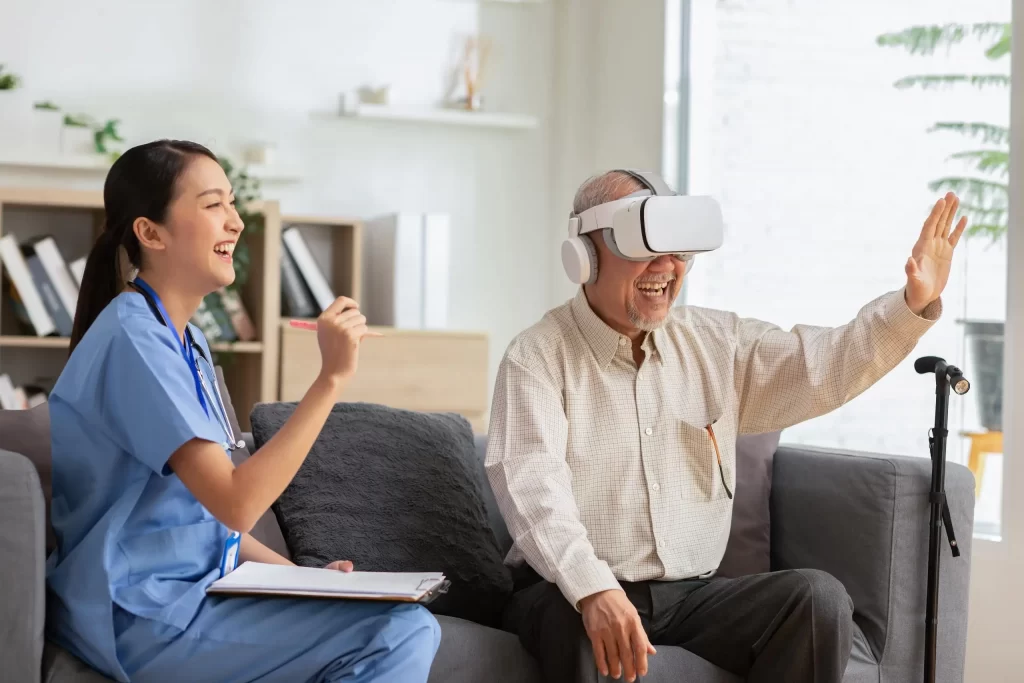Metaverse in Healthcare: Exploring the Future of Medicine
- Unimrkt Healthcare » Blog » Metaverse in Healthcare: Exploring the Future of Medicine
The impact of metaverse in healthcare and life sciences markets is one of the most discussion-worthy topics today amidst the rapid growth of futuristic technologies. Experts predict that Metaverse will be the next big thing in medicine, very soon.For some context, Metaverse is the technology of the future that is capable of creating decentralized real-time, persistent virtual worlds with immersive experiences. The possibilities and use cases of this revolutionary innovation in life sciences and healthcare landscapes are endless.In today’s blog, we’ll explore the transition of healthcare from traditional frameworks to avant-garde technologies and the potential impact it can have on patient care. Let’s get started!
How the Metaverse is Revolutionizing Healthcare?
The term ‘metaverse’ is used for the virtual space that combines virtual reality (VR), augmented reality (AR), and mixed reality (MR). It allows people to have realistic but immersive experiences with the help of 3D environments, worlds, or places.This concept originated from the gaming industry, but its application can be extensive, especially in the healthcare industry. The XR technology (collective term for AR, VR, and MR) can be used for various applications such as medical training, healthcare data management, virtual patient care, and more.Several major hospitals and pharma companies are using Metaverse to connect with patients and improve their access, enhance the accuracy of diagnostics and treatments, and reduce the costs of care delivery, medical staff education, and boost the efficiency of their operations.
Applications & Use Cases of Metaverse in Healthcare
From the possibility of digital twins that replicate real-world patients to virtual hospitals, AI-driven health care, and medical staff training, there are numerous incredible applications and use cases of Metaverse in healthcare that early adopters are already exploring.Let’s take a look at some of the key potential applications of this futuristic approach in medicine:
Mental Health & Neurological Treatments
A BCG study revealed that the use of Metaverse for therapies and treatments related to mental health and neurological disorders is one of the top applications of the technology right now, with 23% of health-tech companies utilizing it.There are several XR-powered mental health support devices, which are even FDA-approved, to treat anxiety, depression, phobias, stress, and other similar issues. Moreover, Metaverse also enables cognitive therapy, support groups, psychiatric evaluations, and rehab opportunities.
Medical Training and Education
Metaverse provides immersive capabilities including 3D visuals, 360 videos, and haptics, that offer cost-effective simulation options for medical staff training, education, and onboarding. Medical training is usually expensive and dependent on the availability of cadavers, equipment, and medical professionals. The immersive experience technology can solve these issues.
Surgical Planning and Simulation
Training surgeons on tools and procedures is immensely challenging with static 2D images, but the metaverse provides an immersive environment where surgeons can learn, plan, or practice a complex procedure to get prepared with higher precision and consistency. This is already being tried, as a leading MedTech organization has partnered with Microsoft to use the latter’s HoloLens to render 3D images of operating threats to optimize the floor plan.
Radiology Visualization
Similarly, medical images during radiology diagnosis are also visualized in 2D screens and metaverse can provide advanced visualization techniques to enhance medical imaging. This immersive approach can offer realistic experiences, better diagnosis, and treatment planning.
Virtual Healthcare Facilities
Metaverse in the health industry also provides the opportunity to offer remote services (diagnosis, treatment, monitoring, and care) to patients who don’t wish to visit physically or live in faraway places through virtual hospitals and clinics powered by AR and VR devices.This solves the shortage of medical staff and makes healthcare more inclusive. Early metaverse adopters in Saudi Arabia and UAE are already testing this concept. A renowned healthcare provider in Dubai recently inaugurated its first hospital in the metaverse.It allows patients to experience its services before traveling to the physical space, including consulting with their doctors through VR. Patients can also seek treatment in the virtual space for certain diseases and conditions.
Digital Twins for Medical Research
Digital twins can be created with the help of real-world patient data, records, and other medical information to enable simulations and insights. They can help develop personalized medicine, and treatment plans, evaluate the effectiveness of care, assess the performance of medical devices, and other crucial findings.
Benefits of Integrating Metaverse in Healthcare
With such extraordinary and disruptive applications and use cases of Metaverse in medicine, it provides an extensive range of benefits that solve prolonged problems within the industry. Here are the key benefits of integrating metaverse in the medical industry:
- Enhanced Training & Education: Metaverse and XR technology make medical education and training more effective and convenient with immersive learning opportunities.
- Increased Convenience & Accessibility: Virtual healthcare facilities and telemedicine through metaverse can make remote patient care more effective, convenient, and highly inclusive.
- Improved Cost Efficiency: The use cases of metaverse can save a significant amount of money that would’ve been required to be spent on training the staff, patient care, and other operations.
- Better Patient Outcomes: Metaverse enables better patient engagement, monitoring, and adherence to treatment, leading to improved patient outcomes.
- Faster Research & Clinical Trials: Life-like dimensions and objects present within the metaverse help professionals simplify medical research and clinical trials.
What Does the Future of Medicine Look Like with Metaverse?
Metaverse in healthcare is set to revolutionize the industry, as predicted by the experts and early trends. Ongoing research and pilot programs about the applications of this technology in medicine indicate that we are already in the early adoption phase.Healthcare providers, technology companies, and regulatory bodies across the globe are collaborating to discover mutual solutions to reap the benefits of the metaverse. Bloomberg reports that the metaverse market could reach up to $800 billion by the end of 2024. Corporations, venture capitalists, and private equity firms had invested over $120 billion in the metaverse space only during the first five months of 2022, with interest in the technology being at an all-time high (ATH). However, this ultra-modern tech also carries some downsides along with the positives.For instance, the use of metaverse for patient care and monitoring poses critical privacy and security concerns. Another significant limitation is the inadequate knowledge and experience of healthcare professionals about the adoption of this technology, its integration, and its usage.Furthermore, metaverse-hosted virtual healthcare facilities bring ethical and legal concerns amidst outdated existing regulations. Thus, these limitations must be dealt with appropriately before the metaverse is normalized in the health sector.
Final Word
Metaverse in healthcare is a revolutionary approach that offers brilliant problem-solving applications and use cases. However, it’s in an early phase currently and needs more refinement through expert-led organizations before its widespread implementation.The transition has already begun with several MedTech players working to utilize metaverse, XR, blockchain, and other advanced technologies to upgrade and tweak the industry. New startups are emerging and patents are getting filed as more advancements become imminent.It’s the perfect time to invest in healthcare market research to stay updated with recent developments and groundbreaking discoveries. If you are looking for someone with an impeccable track record of conducting medical device market research, look no further than Unimrkt Healthcare. Throughout the years, we have consistently applied scientifically validated methodologies for research in the health industry, ensuring the delivery of actionable data through meticulous targeting of respondents. To learn more about how we can help you with your medical market research surveys, call +91-124-424-5210, +91-9870-377-557, or email sales@unimrkthealth.com. You may also fill out our contact form, and our team of experts will assist you as soon as possible.
Recent Posts
- Mapping the Healthcare Value Chain: A Market Research Perspective
- Decoding Emotional Triggers in Treatment Choices: A Qualitative Approach
- Why Business Research Matters for Startups Expanding into New Markets
- Assessing the Impact of AI Nursing Robots in Healthcare Through Qualitative Research
- From Concept to Market: Using Research to Ensure Animal Health Product Acceptance
Archives
Quick Enquiry
Customer Service, We Make it Better
Related Posts:
Let's Connect
Please, fill in the form to get in touch!



